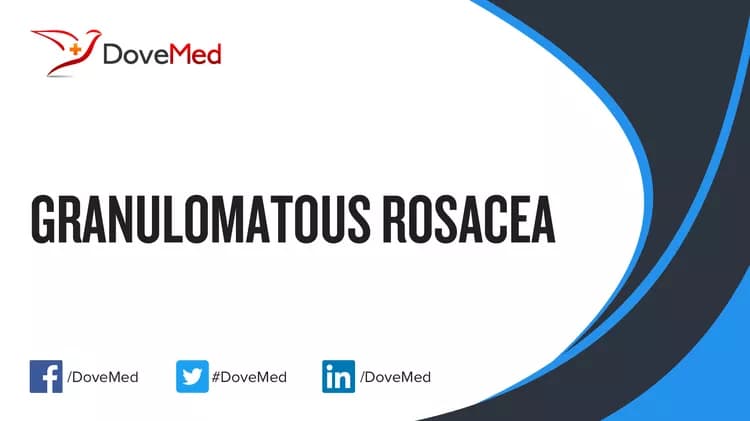What are the other Names for this Condition? (Also known as/Synonyms)
- Granulomatous Facial Dermatitis
- Lupoid Rosacea
What is Granulomatous Rosacea? (Definition/Background Information)
- Granulomatous Rosacea is a rare subtype of rosacea, which is a common and chronic skin condition that manifests as reddish skin with papules and pustules on the face, especially near the eyes, nose, and mouth
- In Granulomatous Rosacea, the lesions involve the face and appear as papules and nodules with reddish discoloration. The condition may be misdiagnosed as other skin conditions such as miliaria and cutaneous sarcoidosis
- Most cases have been reported in middle-aged women; however, the cause and predisposing factors of Granulomatous Rosacea are not well-established
- The condition may be difficult to treat, but treatment may include both topical and systemic therapy. The prognosis of Granulomatous Rosacea is typically good with adequate treatment
Who gets Granulomatous Rosacea? (Age and Sex Distribution)
- Granulomatous Rosacea is a variant of rosacea and represents about 10% of all rosacea cases
- The condition is typically seen in women during middle-age
- However, males may also be affected
- Worldwide, individuals of all racial and ethnic groups may be affected
What are the Risk Factors for Granulomatous Rosacea? (Predisposing Factors)
- Currently, no risk factors have been clearly identified for Granulomatous Rosacea
It is important to note that having a risk factor does not mean that one will get the condition. A risk factor increases one’s chances of getting a condition compared to an individual without the risk factors. Some risk factors are more important than others.
Also, not having a risk factor does not mean that an individual will not get the condition. It is always important to discuss the effect of risk factors with your healthcare provider.
What are the Causes of Granulomatous Rosacea? (Etiology)
The exact cause of development of Granulomatous Rosacea is presently unknown. However, according to research, it is believed that the condition may arise from any of the following:
- Human demodex mites that are parasitic organisms present in sebaceous glands, and pilosebaceous follicles that have hair and oil glands
- Increased sun exposure leading to skin damage
- Crohn’s disease
What are the Signs and Symptoms of Granulomatous Rosacea?
The signs and symptoms of Granulomatous Rosacea may vary from one individual to another and may be mild or severe. It may include the following:
- Presence of skin lesions on the face (cheeks, nose, and around the mouth); the lesions may be red, brown, yellow, or buff-colored
- The lesions may be in the form of papules (raised skin areas) or nodules
- The condition may be accompanied by mild inflammation
How is Granulomatous Rosacea Diagnosed?
Granulomatous Rosacea is diagnosed on the basis of the following information:
- Physical examination of the individual and medical history evaluation
- Blood tests and bacterial culture to rule out any bacterial infection
- Dermoscopy: Dermoscopy is a diagnostic tool where a dermatologist examines the skin using a special magnified lens
- Wood’s lamp examination: In this procedure, the healthcare provider examines the skin using ultraviolet light. It is performed to examine the change in skin pigmentation
- Skin biopsy, if necessary: A skin biopsy is performed and sent to a laboratory for a pathological examination. The pathologist examines the biopsy under a microscope. After putting together clinical findings, special studies on tissues (if needed) and with microscope findings, the pathologist arrives at a definitive diagnosis
A differential diagnosis may be necessary to eliminate other conditions that present similar signs and symptoms. This may include:
- Lupus miliaris disseminatus faciei
- Mycobacterial infection
- Sarcoidosis (especially cutaneous sarcoidosis)
Many clinical conditions may have similar signs and symptoms. Your healthcare provider may perform additional tests to rule out other clinical conditions to arrive at a definitive diagnosis.
What are the possible Complications of Granulomatous Rosacea?
The complications of Granulomatous Rosacea may include:
- Emotional stress due to cosmetic concerns
- Treatment difficulties and medication side effects have been noted
- Secondary bacterial or fungal infections
- Scarring of skin
- Recurrence of the condition
- The skin condition may inadvertently get aggravated by a host of common factors, which include anxiety, certain foods, drinks containing caffeine, heavy exercising, including sun and wind exposure
How is Granulomatous Rosacea Treated?
Currently, there is no established cure for Granulomatous Rosacea. The treatment depends upon the severity of the subtype of Rosacea. The treatment provided is to mostly reduce severity of the symptoms, which may involve the following measures:
- Topical keratolytic creams and antibiotics
- Oral medications such as antibiotics
- Low-dose isotretinoin therapy
- Systemic therapy
- Using laser surgery for cosmetic issues
- Electrosurgery
- Protecting the skin from sun, such as by using suitable sunscreens, wide-brimmed hats, protective clothing, etc.
- Follow-up care with regular screening and checkups are important
How can Granulomatous Rosacea be Prevented?
- Currently, Granulomatous Rosacea is not preventable, since the cause of this skin condition is unknown
- However, avoiding the exacerbating or triggering factors is important to control severity of the condition
What is the Prognosis of Granulomatous Rosacea? (Outcomes/Resolutions)
- The prognosis of Granulomatous Rosacea is good with appropriate treatment. But the condition can be longstanding and cause emotional stress and depression in the affected individuals
- Individuals with mild conditions have better prognosis than those with severe symptoms and complications. The condition may also recur, even after complete resolution following adequate treatment
Additional and Relevant Useful Information for Granulomatous Rosacea:
The following DoveMed website link is a useful resource for additional information:
Related Articles
Test Your Knowledge
Asked by users
Related Centers
Related Specialties
Related Physicians
Related Procedures
Related Resources
Join DoveHubs
and connect with fellow professionals



0 Comments
Please log in to post a comment.